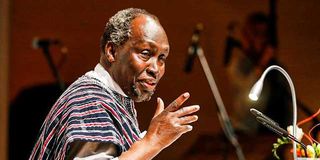Growing up in Baricho, Kirinyaga, my early years were shaped by the captivating stories of Barbara Kimenye and Cynthia Hunter. Kimenye’s series on a character named Moses mirrored the trials of a young boy navigating his formative years, while Hunter’s books sparked my imagination as a young reader. The moment I discovered Meja Mwangi's , with its unforgettable characters like Chikuri and Kisangi, my passion for reading deepened.
I was embarking on a journey to uncover the beauty of language and its power as a form of expression. Years later, a friend introduced me to the seminal work of Prof Ngugi wa Thiong’o, . He cautioned me against reading it in public due to its ban by the Daniel Moi regime.

This book opened my eyes to the powerful play Trial of Dedan Kimathi, co-written by Ngugi and Micere Mugo. The play vividly depicted a resolute Dedan Kĩmathi, steadfastly rejecting a plea deal and challenging the legitimacy of colonial laws. This encounter with Ngugi’s work deepened my understanding of resistance and ignited a profound respect for the power of literature to confront injustice I craved more of Ngugi’s work, and like any admirer, I dreamed of meeting Ngugi in person.
I longed to tell him how had awakened my awareness of Kenya’s struggle for independence and the daunting challenges faced by its pioneers in the post-independence era. His writings had not only educated me but also ignited a deeper consciousness about our nation’s turbulent journey to free.
















